Dyson has been improving their V-series vacuum line for a few years now.
This week we will take a look at the very first V-series vacuum, the V6, and see how the Dyson V6 vs. V7 stacks up.
Does the Dyson V7 have enough improvements to edge out the V6? There’s only one way to know.
Continue reading to find out!
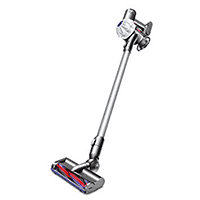
- Max Suction: 100 AW
- Run Time: 20 minutes
- Recharge: 3.5 hours
- Dustbin: 0.4 L
- Weight: 4.5 lbs
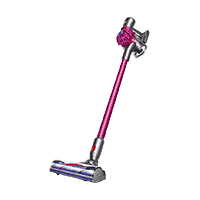
- Max Suction: 100 AW
- Run Time: 30 minutes
- Recharge: 3.5 hours
- Dustbin: 0.4 L
- Weight: 5.45 lbs
Dyson V6 vs. V7 Design Differences
At first glance, the Dyson V6 and Dyson V7 look virtually identical. If it weren’t for the different color schemes carried out by each vacuum, it would be rather hard to tell a difference between the two.
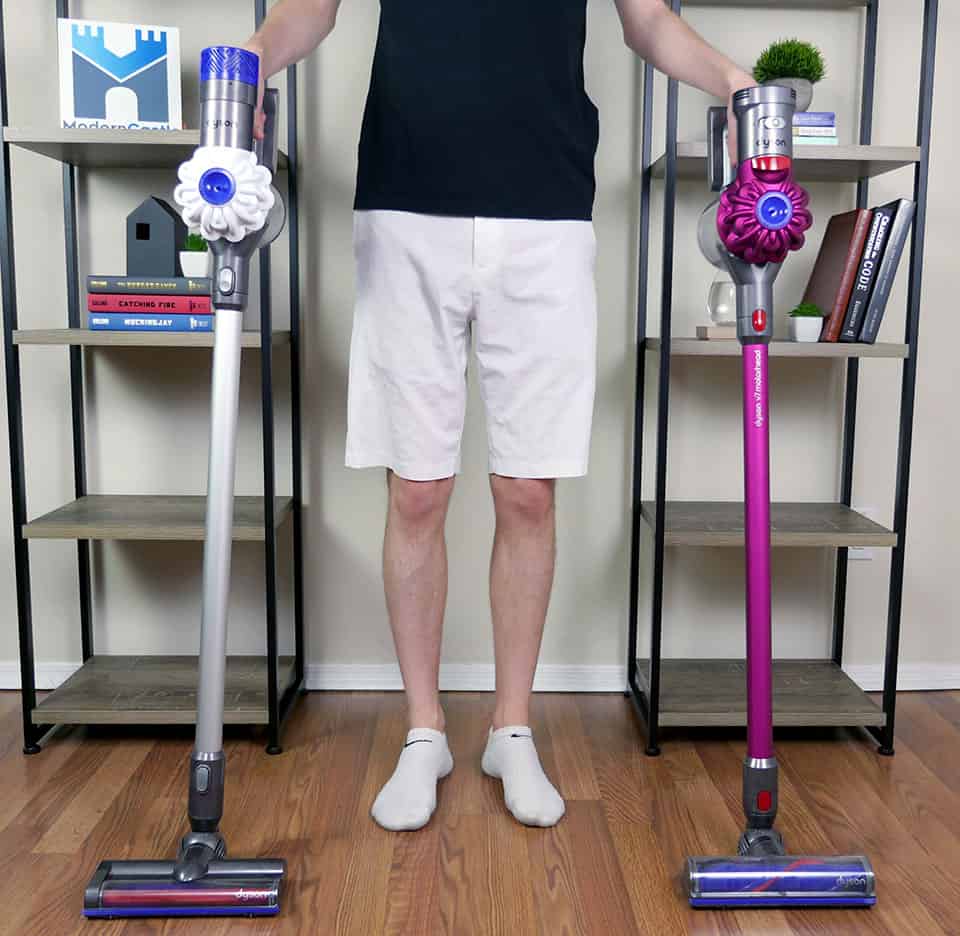
The V6 contains a a white and gray color scheme, whereas the V7 is pink and gray (at least on the HEPA and Motorhead models, respectively).
Dyson intentionally applies different colors to each of their V-series vacuums to avoid any confusion as to which model is which.
First and foremost, while Dyson does offer a variety of different models on both the V6 and V7, the functional components on each vacuum model listed below are the same.
So all Dyson V6’s have the same motor, same battery, and the same dust bin. Likewise, all Dyson V7’s have the same motor, same battery, and same dust bin. The notable differences are accessories, filters, and cleaning heads.
RELATED – Wonder how Shark stacks up? See our Shark vs. Dyson comparison next.
Dyson V6 Model Comparisons
The Dyson V6 comes in six different models:
- Dyson V6 Absolute – The V6 Absolute is Dyson’s most expensive V6 model, but that is due to the large amount of accessories included with the model. The Absolute includes virtually every available accessory. In addition, it includes both a multi-surface brushroll cleaning head and soft roller brush cleaning head.
- Dyson V6 Fluffy – The Fluffy version of this vacuum includes a good number of extras, but the main component is the soft roller cleaning head. This tool is best used for hard floor types and larger debris.
- Dyson V6 Animal – The Dyson V6 Animal includes everything the Absolute has in terms of accessories, except it doesn’t include the fluffy soft roller head.
- Dyson V6 Motorhead – The V6 Motorhead is a less expensive version and includes the fewest accessories. Includes a multi-surface cleaning head. Does not include a HEPA filter.
- Dyson V6 HEPA – Th V6 HEPA has fewer accessories (like the Motorhead), but still include HEPA filtration. However, this model isn’t widely available.
- Dyson V6 Cord Free – Dyson also offers a barebones version of the V6 with minimal accessories and no HEPA filtration. Sometimes it’s called the “Dyson V6 Cord Free”. However, given it’s still fairly pricey we recommend stepping up to one of the other models.
Dyson V7 Model Comparisons
The Dyson V7 is available in four different models:
- Dyson V7 Absolute – The Absolute model includes more parts and accessories than any other model. It also includes both a multi-surface brushroll cleaning head and soft roller brush cleaning head.
- Dyson V7 Animal – The V7 Animal includes everything the V7 Absolute has, except it does not include the soft roller brush cleaning head.
- Dyson V7 Motorhead – Less expensive, but also only includes basic accessories. Does not include a HEPA filter. Only includes multi-surface brushroll cleaning head.
- Dyson V7 HEPA – the V7 HEPA is basically the V7 Motorhead, but with a HEPA filter.
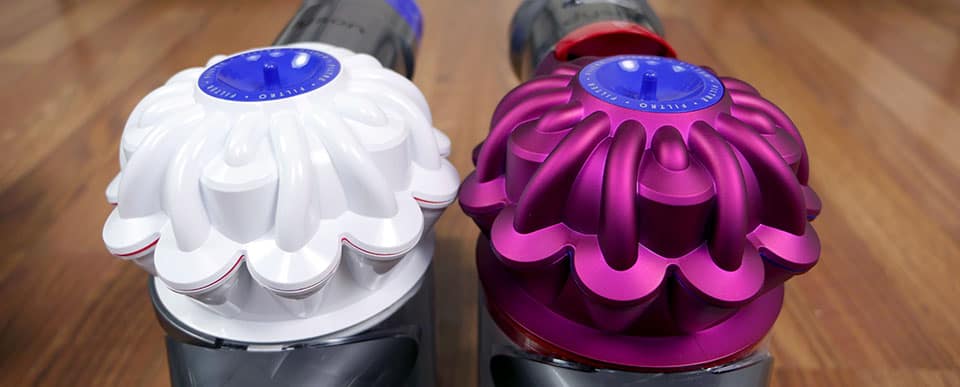
How the Dyson V6 & V7 Clean
Both the Dyson V6 and Dyson V7 utilize the original radial cyclone design.
The V6 and V7 have stacked radial cyclones stacked on top of the dust bin. While this look has been used throughout the V-series line, Dyson did make a change to their new V10, creating more of a streamlined look. The cyclones on the Dyson V10 are in line with the dust bin instead of perpendicular to it, like the V6 and V7.

Cleaning Heads
Although we tested the Dyson models that included a Direct Drive head, both the V6 and V7 have models that include the soft roller head. The main difference between the V6 and V7 Direct Drive head is the size of the brushroll. The V7 has a slightly bigger brushroll, which leads to a bigger head overall.
The Direct Drive head is powered by squeezing the trigger on the handle of the vacuum. Once the trigger is squeezed, the brushroll will begin to spin.
RELATED – Want the absolute best performance Dyson can offer? See our Dyson V6 vs. V7 vs. V8 vs. V10.
If you decide to choose a V6 or V7 that includes the soft roller head, keep in mind that this head is best suited for hard floor surface types. Its design helps avoid scratching your more delicate floors, while also being better at picking up larger debris.
2-in1 Design
Once again, both the V6 and V7 can be used as either a stick or handheld vacuum. This 2-in-1 design is the same design implemented by Dyson into all of their V-series vacuums.
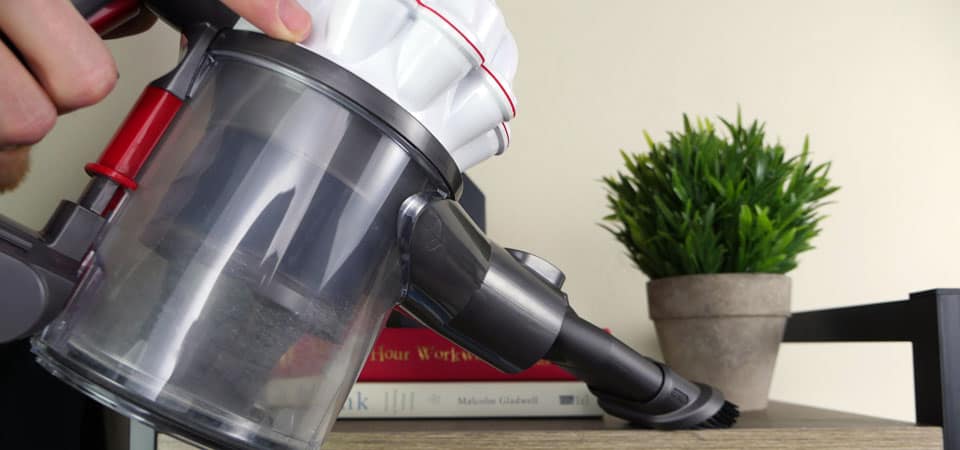
What’s the size of the Dyson V6 and V7?
The Dyson V6 and V7 are almost built with the same dimensions. The only differences between these two Dyson vacuums are their heights and weights.
The Dyson V6 totals 47.5″ tall, which is 1.5″ shorter than the Dyson V7 (49″ tall).
With regard to weight, the V6 is a touch lighter, coming in at 5.1 pounds. The V7 totals 5.45 pounds in weight, so the difference is not enough to alter the overall performance of this vacuum.
Aside from these two areas, the width, and depth are identical between the V6 and V7.
Dyson V6 Size
- Height: 47.5″
- Width: 9.8″
- Depth: 8.2″
- Weight: 5.1 lbs.
Dyson V7 Size
- Height: 49
- Width: 9.8″
- Depth: 8.2″
- Weight: 5.45 lbs.
What accessories come with the V6 and V7?
The following table indicates the parts and accessories that are included on the most popular available versions of both the Dyson V6 and Dyson V7.
| Accessory | Dyson V6 Fluffy | Dyson V6 Absolute | Dyson V7 Motorhead | Dyson V7 Animal | Dyson V7 Absolute |
|---|---|---|---|---|---|
| Wand | Yes | Yes | Yes | Yes | Yes |
| Charger | Yes | Yes | Yes | Yes | Yes |
| Wall mount | Yes | Yes | Yes | Yes | Yes |
| Soft roller cleaning head | Yes | Yes | No | No | Yes |
| Direct Drive brushroll | No | Yes | Yes | Yes | Yes |
| Combination tool | Yes | Yes | Yes | Yes | Yes |
| Crevice tool | Yes | Yes | Yes | Yes | Yes |
| Dusting brush | Yes | Yes | No | Yes | Yes |
| Mini-motorized tool | Yes | Yes | No | Yes | Yes |
Each of these vacuums has a model that includes both the soft roller head and a direct drive (motorized brushroll) head. Be sure to double check that the model you are interested in has the appropriate cleaning head(s).
The differences between these two heads are:
- Soft roller head – Designed to provide softer contact to your hard floor surfaces and handle larger debris types with ease.
- Direct drive head – The direct drive head offers a motorized brushroll that can be used on any indoor floor type (best for carpets, but safe for hardwoods). This brushroll works to agitate dirt and debris in order to suck it up.
Direct Drive Cleaning Head
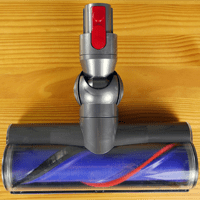
This is the standard cleaning head designed for multi-surface use. It’s ideal for carpets, though it’s safe for hardwood floors. Uses a motor driven brushroll.
Soft “Fluffy” Cleaning Head
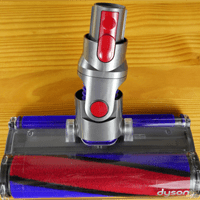
This softer brushroll is known as the “Fluffy” cleaning head. It’s designed for hardwood floors and other hard surfaces and is ideal at picking up both larger debris, as well as fine particles.
Wand
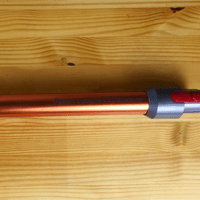
The wand can be used as part of the standard sick vacuum configuration. Alternatively, you can also use it with other attachments (dusting brush, crevice tool, etc.) for added reach around the home.
Charger
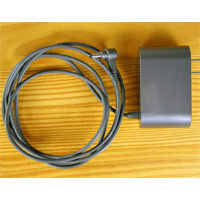
Plugs from the wall directly into the rear of the unit to charge the battery.
Wall Mount Docking Station
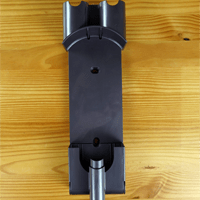
You can mount the docking station on the wall, which allows you to easily hang the Dyson vacuum in your kitchen, laundry room, closet, or elsewhere.
Crevice Tool
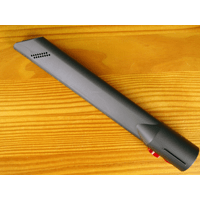
Provides extra reach, in addition to allowing you to use precise suction for hard to reach spots or spots that just require a more surgical cleaning approach (ie, in between couch cushions).
Combination Tool
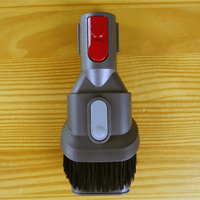
A 2-in-1- cleaning tool that you can use as a dusting brush or for cleaning upholstery / fabrics.
Dusting Brush
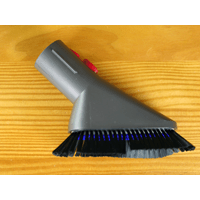
A standalone dusting brush with soft bristles for more delicate cleaning and debris removal.
Mini Motorized Brushroll
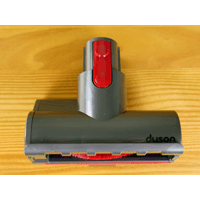
This compact motorized brushroll is great at removing pet hair or other debris that requires agitation from carpets, upholstery, and other fabric surfaces.
Dyson V6 vs. V7 Cleaning Tests
The following vacuum cleaner tests are designed to show how the Dyson V6 and Dyson V7 perform on different surfaces, picking up a variety of debris types.
We test on three different floor types, including hardwood floors, low pile carpet, and high pile carpet.
Dyson V6 Overall
91%
Dyson V7 Overall
92%
Dyson V6 Cleaning Scores
Hardwood
87%
Low Carpet
94%
High Carpet
92%
Dyson V7 Cleaning Scores
Hardwood
77%
Low Carpet
99%
High Carpet
99%
Hardwood Floor Cleaning
Performance between the V6 and V7 throughout our hardwood floor tests were similar for most debris types. The V7 did struggle with the cereal and rice more so than the V6, but those were the only major differences between the two vacuums on this test.
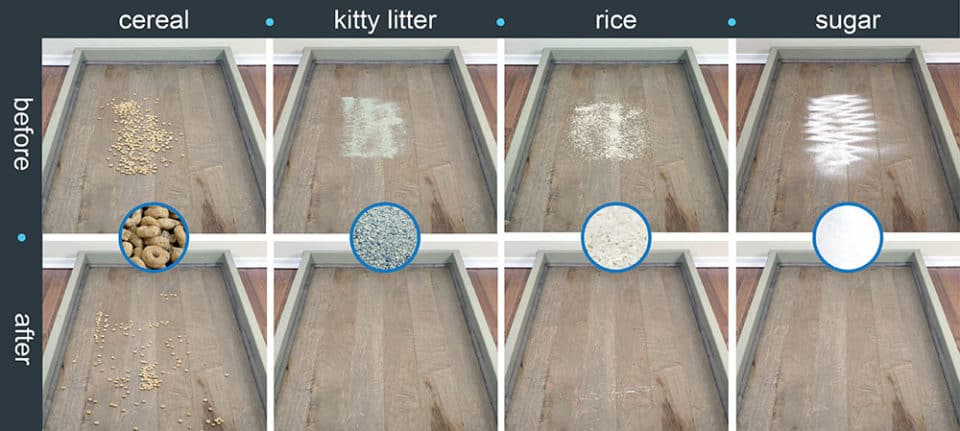
As we completed the rice test on the hardwood floors, the V6 was able to avoid flinging the rice around, whereas the V7 had a tendency to do so. Due to the V7 flinging the rice around it was only able to clean up 66% of the debris versus 99% cleaned up by the V6.
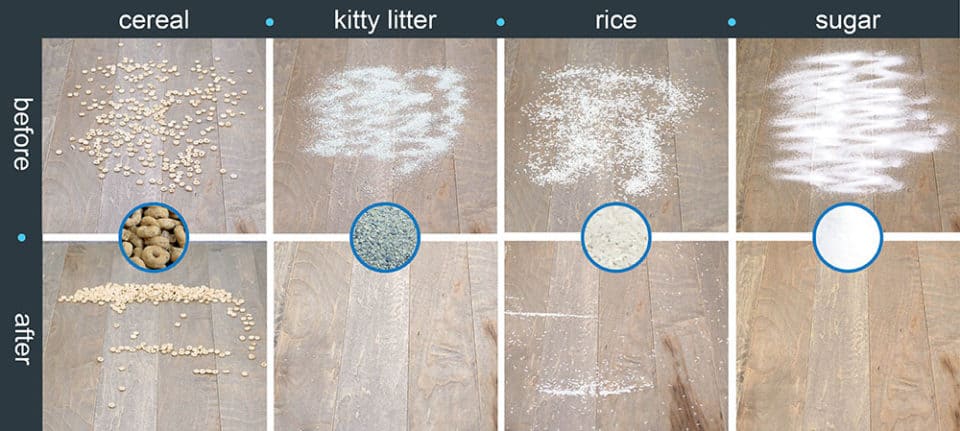
Additionally, cereal was a major issue for the V7. Being a newer model than the V6, I expected the V7 to perform better throughout the cereal test, but that was not the case.
The V7 simply pushed all of the cereal forward and did not suck up a single piece. On the other hand, the V6 was able to roll over the cereal and clean up 50% of it.
There were some definite bumps along the way during our hardwood floor tests. That said, each vacuum was only tested with the Direct Drive motorized brushroll.
We did not have the soft roller head for either of these vacuums, which we believe could have helped them on the hardwood floors.
For our comprehensive testing data see our full Dyson V6 review and Dyson V7 review.
Low Pile Carpet Cleaning
As we moved onto the low pile carpet cleaning tests, the V7 took a leap ahead of the V6. Although three of the four debris types were cleaned up at almost identical levels, the cereal test was a game changer.
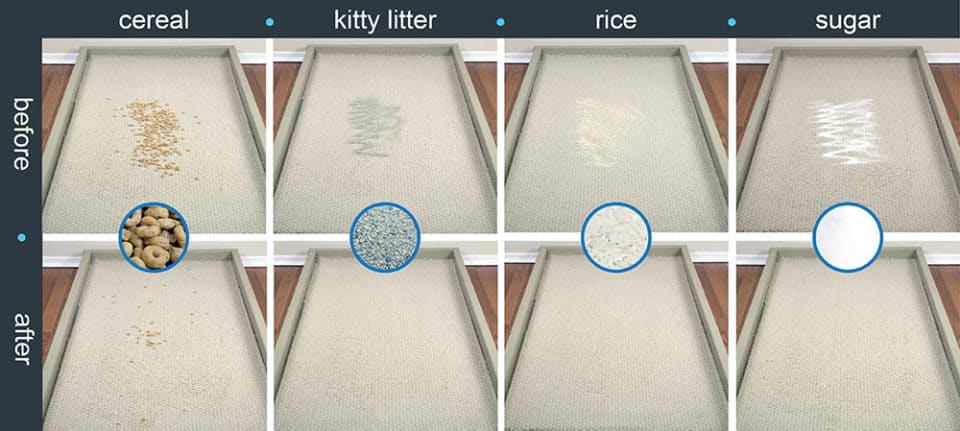
The V6 still improved from the hardwood floor test, cleaning up an addition 26% of the cereal, reaching a total of 76% cleaned up.
That said, the V7 was able to suck up all of the cereal on the low pile carpet, which was a major change from 0% on the hardwood floors.

Sugar, rice, and kitty litter were no match for either of these Dyson vacuums on the low pile carpet.
For our comprehensive testing data see our full Dyson V6 review and Dyson V7 review.
High Pile Carpet Cleaning
Lastly, the high pile carpet cleaning tests. Once again, the V7 claimed a victory over the V6 during the cereal portion of the cleaning test, but all three of the other debris types were virtually the same.
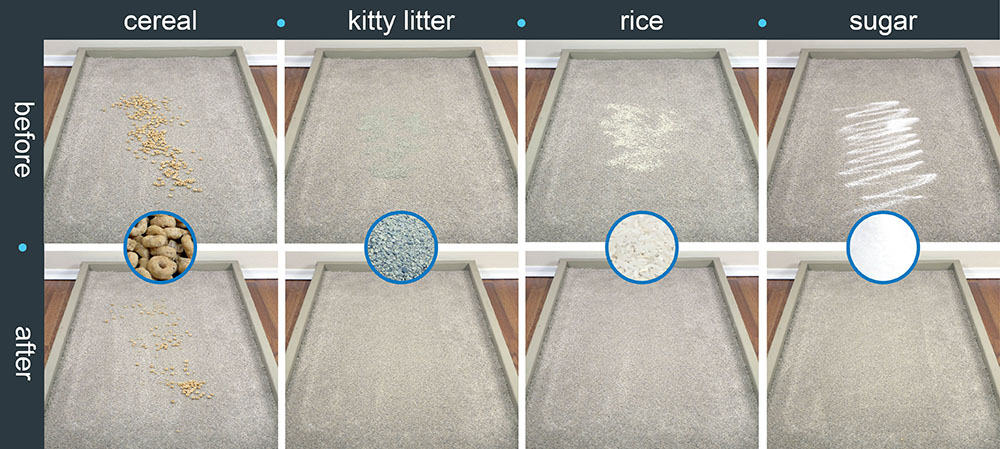
The V6 did show a slight drop in performance when it came to the cereal test on high pile carpet, moving from 76% down to 70%. The difference was not dramatic, but did create a 30% gap between the V6 and V7.
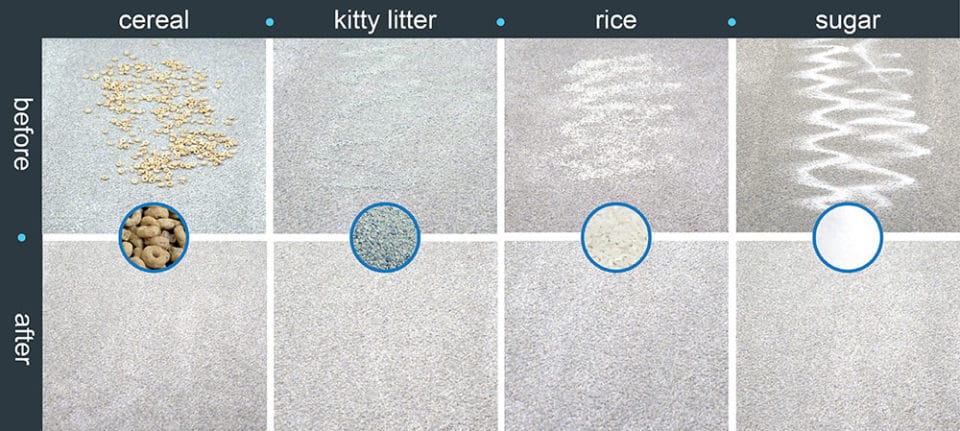
Both of these vacuums performed quite well on the high pile carpet, but the V7 did have a slightly stronger outing.
For our comprehensive testing data see our full Dyson V6 review and Dyson V7 review.
RELATED – What’s the best vacuum for carpet? Find out now.
Using the Dyson V6 & Dyson V7
Unboxing each of these vacuums is a simple task, but can be time consuming as Dyson wraps each piece individually in plastic.
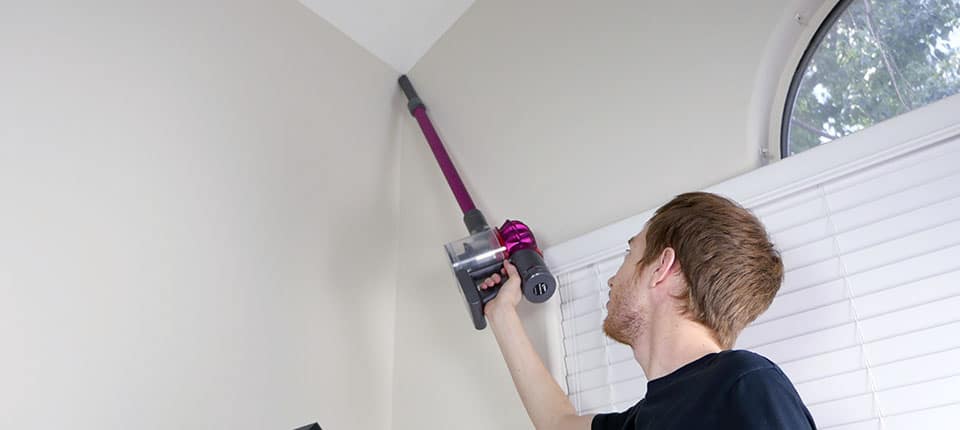
Setup
After removing all parts from the packaging, the setup is also quite simple. Snap in the desired piece (i.e. wand and tool or just the tool without the wand), charge the vacuum, and you’re good to go.
RELATED – Can it get easier than not having to vacuum at all? Robot vacuums can do the vacuuming for you. Check out a couple of our favorites, the Roomba 650 and Eufy Robovac 11.
Daily Use
When it comes to using the V6 and V7, both utilize the same design concept, as do the rest of the Dyson V-series vacuums.
Powering the vacuum is controlled by squeezing the trigger located on the handle of each unit. The motor only runs when the trigger is pulled, therefore saving battery as the motor turns off as soon as that trigger is released.
2-in-1
Both the Dyson V6 and V7 can be used in the form of a stick or handheld vacuum. The transition time is quick and painless. To use each one as a stick vacuum, attach the wand into the connection point (quick-release point on the V7) and attach a floor head cleaning tool.
On the contrary, remove the wand and insert a cleaning tool directly into the suction slot to use the V6 or V7 as a handheld vacuum.
If you already have a standalone stick vacuum and just need a handheld vacuum check out the Dyson V6 Trigger.
Emptying the Dust Bin
The V6 and V7 do have slightly different dust bin emptying processes. The V6 has a red lever that can be pushed down to release the bottom of the dust bin.
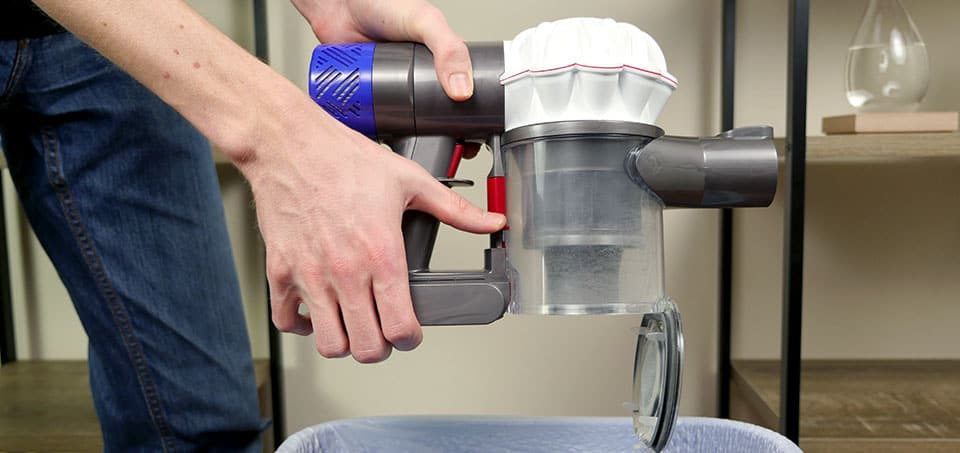
The V7 is a bit different and a touch more sanitary. The tab to release the dust bin on this Dyson vacuum is on top of the dust bin, directly behind the radial cyclones. Users can pull up on this tab to empty the dust bin.
Unlike the V6, the dust bin actually drops down into the trash can as well, helping to avoid spilling any of the dirt and debris outside of the trashcan’s perimeter.
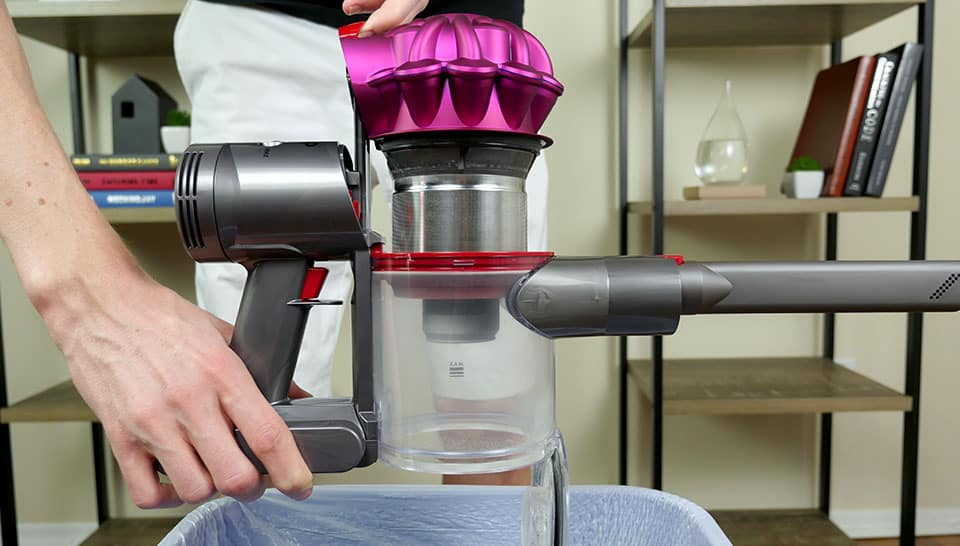
More Dyson Vacuum Comparisons
Looking for more Dyson comparisons? See our complete list below:
- Dyson V6 vs. V7 vs. V8 vs. V10
- Dyson V6 vs. V8
- Dyson V7 vs. V8
- Dyson V6 vs. V10
- Dyson V7 vs. V10
- Dyson V8 vs. V10
Dyson V6 vs. V7 Maneuverability Differences
Maneuverability is another area where the Dyson V6 and Dyson V7 are similar.
Portability
The difference in weight is less than of a pound, which makes using each of these vacuums as a stick or handheld feel more or less like the same unit.
Cleaning Angle
By containing an identical design, the cleaning angles between these two Dyson’s are also virtually identical. Both the V6 and V7 have the ability to lie almost completely flat on the ground before the head of the vacuum lifts up off of the ground. This is great for cleaning under furniture.
Additionally, both the V6 and V7 are capable of making 90° turns.
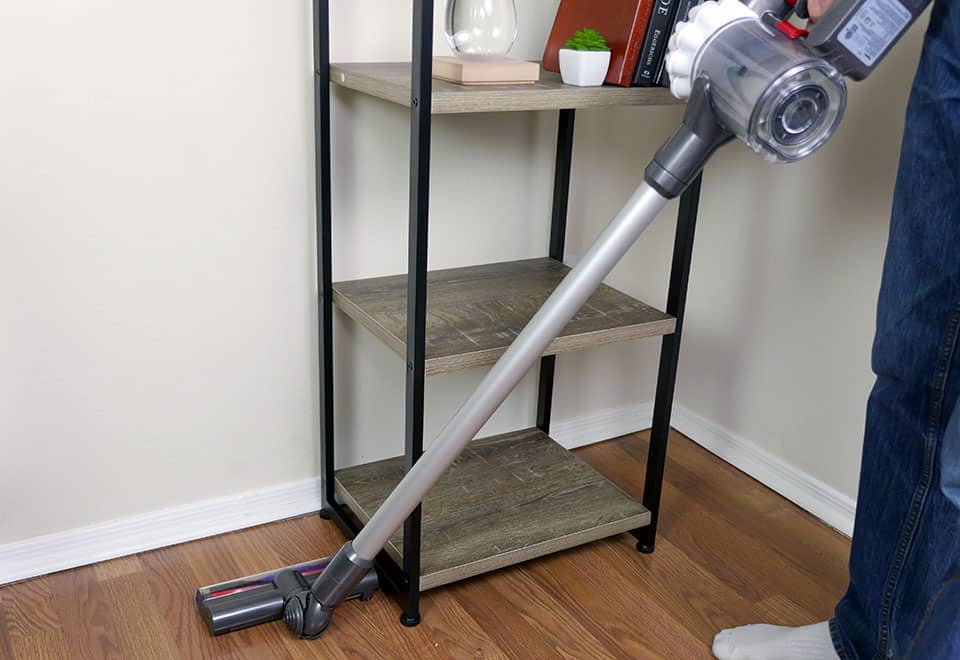
What are the costs to maintain the V6 and V7?
Maintaining each of these vacuums is easy. The main tasks consist of emptying the dust bin, washing / replacing the filters (if needed), and replacing the battery after it dies.
| Part | Replacement Frequency | Dyson V6 | Dyson V7 |
|---|---|---|---|
| Central Filter | Only if damaged or lost | Check Price | Check Price |
| HEPA Filter | Only if damaged or lost | Check Price | Check Price |
| Battery | ~24 months | Check Price | Check Price |
Dust Bin
Emptying the dust bin should be completed after every major cleaning cycle. Washing the primary filter can be completed every few cleaning cycles and only needs to be replaced if lost or damaged. This goes for the HEPA filter as well.
Battery
The battery should last at least the life of the warranty, and could even go as long as 5 years. If it does die within the warranty time frame, Dyson will replace it at no cost to you.
Dyson V6 annual maintenance costs should be around $18 / year and Dyson V7 annual maintenance costs should be around $17 / year.
The annual maintenance costs above reflect replacing the battery every 2 years (always possible it goes longer), which won’t begin until after the warranty expires.
Filters
Dyson notes that their filters are lifetime washable filters. Therefore, you do not need to replace a filter on either one of the Dyson vacuums unless you lose or damage one.
RELATED – Cordless vacuums make mobility significantly easier. See some of the best cordless handheld vacuums here, as well as other cordless stick vacs we like, including the Dyson V8 and Electrolux Ergorapido.
How long will the Dyson V6 and V7 battery last?
The Dyson V6 and V7 batteries are similar, but the V7 does have an edge over the V6. Although the V6 offers 2,200 mAh compared to the V7’s 2,100 mAh, the V7 is able to run for about 30 minutes, whereas the V6 dies closer to 20 minutes.
| Part | Dyson V6 | Dyson V7 |
|---|---|---|
| Capacity | 2,200 mAh | 2,100 mAh |
| Charging Time | 3.5 hours | 3.5 hours |
| Run Time | ~20 minutes | ~30 minutes |
| Replacement Cost | Check Price | Check Price |
Bear in mind, if you switch either of these vacuums into “MAX” power mode, the battery run time will drop to around 6-7 minutes.
How loud is the Dyson V6 and V7?
When comparing noise, the Dyson V6 is a touch louder than the V7. Measured from 3′ away, the V6 comes in around 76 dB and the V7 comes in at 70 dB.

The difference in noise is not easily noted, but the sound could vary depending on the setup of your home.
Is the Dyson V6 or V7 a better value?
Dyson V6 Value
Although the Dyson V6 is the first of its V-series, the value is still quite good. The lower price point combined with the strong cleaning performance and quality is comparable to some of the top end Dyson stick vacuums.
In my opinion, the Dyson V6 offered a stronger cleaning performance on the hardwood floors, in addition to a similar level of cleaning on the low and high pile carpets, as compared to the V7, which leads me to believe it is a slightly better value than the V7.
- Warranty – 2 years
- Returns – Varies by retailer, other retailers may vary
- Check Price
Dyson V7 Value
All in all, the Dyson V7 offers a good value, but I am struggling to say it is better than the V6. The slightly higher price point and struggles it showed on the hardwood floor tests certainly knock down the value a bit, in my opinion.
The only major benefit to owning the V7 instead of the V6 is the battery run time. The extra 10 minutes you gain with the V7 could be enough to sway your opinion.
With several V7 models available, the price of the V7 does fluctuate, but the V6 will more than likely continue to be cheaper than the V7.
- Warranty – 2 years
- Returns – Varies by retailer, other retailers may vary
- Check Price
Dyson V6 vs. V7 Specifications
| Specs | Dyson V6 | Dyson V7 |
|---|---|---|
| Type | Stick | Stick |
| Manufacturer | Dyson | Dyson |
| Model | V6 | V7 |
| Length | 47.5" | 49" |
| Width | 9.8" | 9.8" |
| Depth | 8.2" | 8.2" |
| Weight | 4.5 lbs. | 5.45 lbs. |
| Floor Type | All (indoor) | All (indoor) |
| Dustbin Capacity | 0.4 L | 0.4 L |
| Cordless | Yes | Yes |
| Bagless | Yes | Yes |
| Returns | Varies by retailer | Varies by retailer |
| Warranty | 2 Year limited | 2 Year limited |
| Buy | Check Price | Check Price |
Biggest Differences of Dyson V6 vs. V7
Battery Power
The Dyson V7 has a smaller battery overall (2,100 mAh) but a longer run time (30 minutes). The V6 includes a 2,200 mAh battery with a run time of 20 minutes.
Cleaning Performance
The V6 edges out the V7 on the hardwood floor tests, but the V7 did have a better overall performance on both the low and high pile carpet tests.
Annual Maintenance
The costs to maintain each of these vacuums is more or less the same. Annual maintenance costs on the V6 are $18 / year and the V7 comes in a dollar cheaper, landing at $17 / year.
Should You Buy the Dyson V6?
The Dyson V6 may be the older model, but its price compared to performance is no joke. A 20 minute run time is still a decent amount of time when the vacuum is able to clean most debris types off of most floor types, with ease.
You should buy the Dyson V6 if you…
- Don’t mind a shorter run time – The V6 does have a slightly shorter run time than the V7 (20 minutes compared to 30), but the 20 minute run time is still better than most other stick vacuums we have tested to date.
- Want to save a few bucks – When comparing the V6 to the V7, the V6 will almost always be the less expensive model.
- Want a strong cleaning performance – The Dyson V6 did a great job throughout our cleaning tests, handling all debris types well, on all three of our floor types.
See here for more information or to buy the Dyson V6.
Should You Buy the Dyson V7?
The Dyson V7 is a slightly newer model than the V6, but still one of the older Dyson V-series vacuums. That said, the battery run time, cleaning performance, and quality are all still top of the line.
You should buy the Dyson V7 if you…
- Want a longer run time – The additional 10 minutes of run time you gain with the V7 is a nice benefit with regard to cleaning sessions.
- Want a newer model – The Dyson V7 is the newer model of the two, so if you’re a fan of staying away from the older versions, the V7 may be the more appropriate option.
See here for more information or to buy the Dyson V7.
Updates
- June 7, 2019 – Made changes to formatting, layout, content, images, side-by-side comparison box, and more.
- March 31, 2019 – Updated formatting as part of our site-wide re-design.
